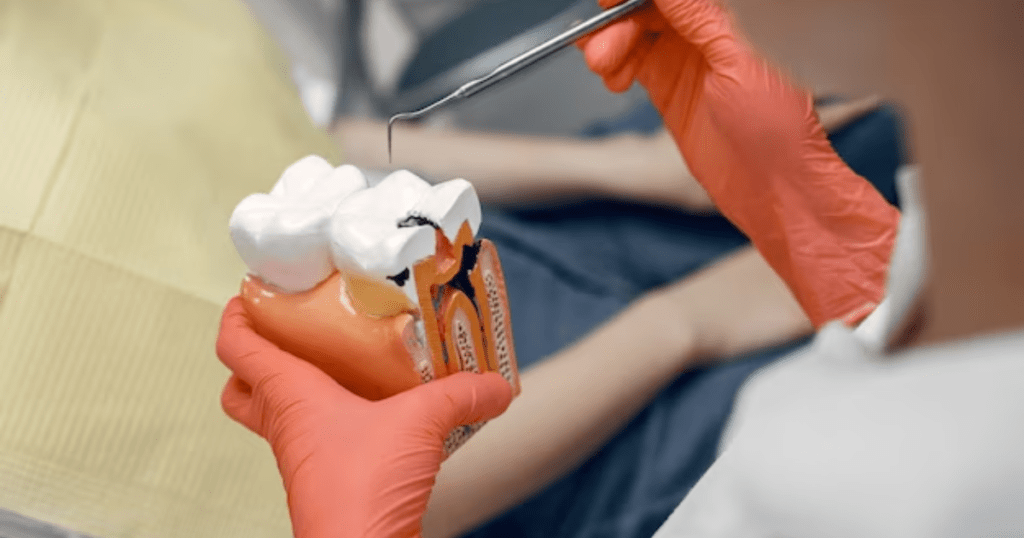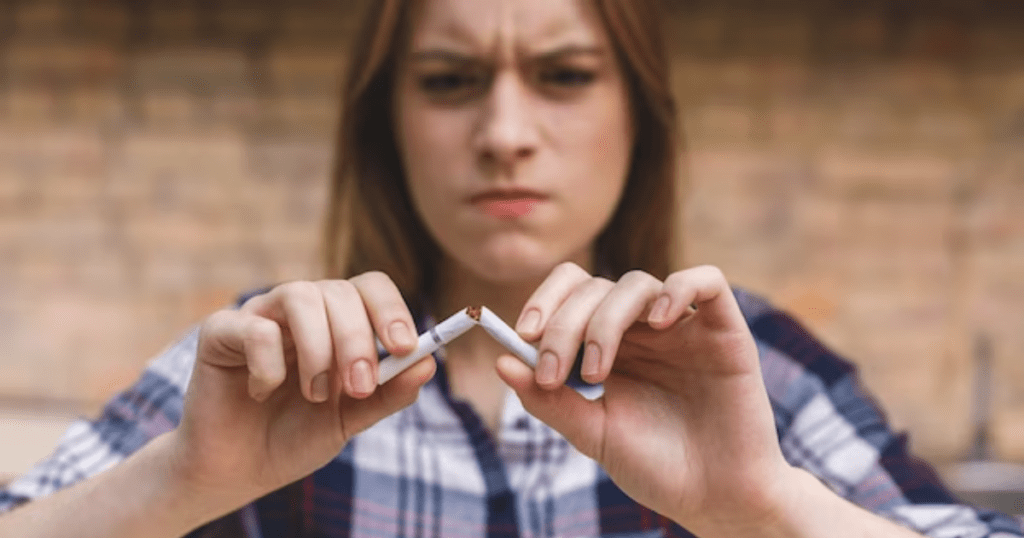Root canal treatment is a dental operation that involves removing the pulp of a badly damaged or diseased tooth, which contains nerves and blood vessels. It is a frequent fallacy that once a root canal is completed, you can return to your normal routine immediately. However, when it comes to smoke, it’s critical to understand the potential hazards and implications for your dental health, especially after having root canal treatment.
What Is a Root Canal?
A root canal is often required when a tooth’s pulp becomes infected or inflamed as a result of extensive decay, many dental treatments on the tooth, faulty crowns, or a crack or chip in the tooth. During the process, the dentist removes the infected pulp, cleans the inside of the tooth, and closes it to prevent further infection.
While the primary purpose of a root canal is to relieve pain and save the tooth, adequate aftercare is essential for optimal healing.
Root Canal Recovery Tips
Although recovery from a root canal operation varies from person to person, the following general advice should assist ensure a speedy recovery:
- Observe Post-Procedure Instructions: Your endodontist or dentist will give you detailed instructions about what to do following the procedure. To guarantee appropriate recovery, strictly follow these directions.
- Take Prescribed Medication: If your dentist has recommended any antibiotics or painkillers, make sure you take them exactly as prescribed. This will lessen discomfort and stop infection.
- Handle soreness: Following a root canal, common soreness can be alleviated with over-the-counter pain medications like Acetaminophen or ibuprofen, following the recommended dosage on the label.
- Refrain from Chewing on the Treated Tooth: Until the treated tooth is fully restored with a crown or filling, refrain from chewing on it to avoid causing additional harm or discomfort. Until then, limit your diet to soft foods.
- Sustain Oral Hygiene: Maintain dental hygiene by brushing and flossing, especially in treated areas, and rinse your mouth with warm salt water to maintain cleanliness and promote healing.
- Keep an Eye Out for Complication Signs: Following a root canal, soreness is common, but intense pain, swelling, or fever may indicate infection or complication. Contact your dentist immediately if these signs occur.
- Attend Follow-Up Appointments: Attending additional appointments set by your endodontist or dentist is crucial for tracking your healing process and ensuring the correct healing of the treated tooth.
- Keep Up a Healthy Diet: Consuming a nutrient-rich, well-balanced diet can aid in your body’s healing process. Steer clear of crunchy or hard foods that could hurt your treated teeth or cause harm.
- Remain Hydrated: Staying hydrated can aid with general healing and ease discomfort. Drink lots of water.
Follow these recommendations and your dentist’s instructions to ensure a smoother and more comfortable recovery from your root canal operation.

Can You Smoke After a Root Canal?
Smoke after a root canal can have a major influence on recovery and overall tooth health. It can slow healing, raise the chance of infection, worsen pain and discomfort, increase the risk of dry socket, and impair the immune system.
To avoid these hazards, it is advisable to stop smoking for at least 48 hours, consider quitting, follow your dentist’s instructions, and look into alternatives such as nicotine patches.
Adhering to post-operative care guidelines and looking for alternatives can help assure a smoother and faster recovery, lower the risk of problems, and promote improved long-term oral health.
Why You Shouldn’t Smoke After a Root Canal
To Smoke after a root canal is strictly advised since it might cause delayed healing and increase the risk of infection. The heat and chemicals from smoking can irritate the sensitive tissues inside the tooth, resulting in inflammation and pain.
Furthermore, smoking affects the immune system, making it difficult for the body to combat potential infections. As a result, smokers are at a much higher risk of developing issues such as abscesses or losing teeth.
How Smoking Negatively Affects Healing?
Smoking has a severe negative influence on the body’s ability to recuperate after injury or surgery. Here are some ways that smoking disrupts the healing process:
- Reduced Oxygen Delivery: Smoking constricts blood arteries, reducing the amount of oxygen in the circulation. Oxygen is essential for tissue repair and wound healing. With less oxygen available, the healing process slows dramatically.
- Impaired Immune Response: Smoking impairs the immune system, leaving the body less capable of combating illnesses. This can result in consequences like surgery site infections and delayed wound healing.
- Delayed Inflammation Resolution: While inflammation is a normal aspect of the healing process, smoking might prolong it. Chronic inflammation produced by smoking might impede the passage to the next stages of healing, resulting in longer recovery durations.
- Decreased Collagen Production: Smoking reduces the formation of collagen, a protein required for wound healing and tissue regeneration. Wounds that lack an adequate supply of collagen may heal more slowly and with weaker scar tissue.
- Impaired Bone Healing: Smoking reduces blood supply to the bones and inhibits osteoblast function, which is responsible for bone production. This can lead to delayed fracture healing or an increased chance of nonunion.
- Compromised Respiratory Function: Smoking impairs respiratory function, which can lead to difficulties during anaesthesia and post-operative recovery. Respiratory disorders can also reduce the body’s ability to supply oxygen to mending tissues.
- Increased Risk of Complications: Smokers are more likely to experience difficulties after surgery, such as wound dehiscence (reopening), tissue necrosis, and infections. These issues can lengthen healing time and necessitate additional medical attention.
Overall, smoking impairs the body’s ability to heal, raising the likelihood of problems and delaying recovery timeframes. Quitting smoking before surgery or during the healing phase can greatly improve outcomes and accelerate recovery.

When Is It Safe To Smoke After A Root Canal?
It is generally recommended that you refrain smoke for at least 72 hours after a root canal operation. Smoking can hinder the healing process and increase the risk of complications such as infection or delayed recovery. Furthermore, smoking may irritate the affected area, resulting in discomfort.
It is vital that you follow your dentist’s advice and avoid smoking until you are cleared to do so. If you have any concerns or questions about smoking after a root canal, consult your dentist for customised guidance.
Alternatives to Smoking Post Root Canal
Smoking should be avoided after a root canal operation to encourage good healing and reduce the risk of problems. Here are some alternatives to smoking:
- Nicotine Replacement Therapy (NRT): NRT products include nicotine patches, gums, lozenges, and inhalers, which supply nicotine to the body without the damaging consequences of smoking. These can assist reduce nicotine cravings while having a minimal impact on the healing process.
- Vaping with Nicotine-Free E-liquids: If you’re using vaping to quit smoking, you should consider using nicotine-free e-liquids instead. While vaping still requires inhaling substances into the lungs, nicotine-free solutions remove the addictive component and may be less hazardous to mending tissues.
- Medication-Assisted Therapy (MAT): Speak with your doctor about prescription drugs that can help lessen nicotine cravings and withdrawal symptoms. Bupropion (Zyban) and varenicline (Chantix) are medications that target the brain’s nicotine receptors and can help people quit smoking.
- Behavioral Therapy and Support Groups: To address the psychological aspects of smoking addiction, consider engaging in behavioural therapy or joining support groups. Cognitive-behavioral therapy (CBT), counselling, and peer support can all provide tools and encouragement for successfully quitting smoking.
- Alternative hobbies: Find hobbies that can divert you from your smoking desires and lessen tension. To cope with triggers and withdrawal symptoms, pursue hobbies, exercise, meditation, or relaxation techniques.
Remember that stopping smoking is good for your health and can improve the outcome of your root canal treatment. By investigating these options and remaining committed to your quit-smoking journey, you can aid in your healing and maintain your dental health.
Read More: How to Get Rid of Pimple on Lip
Final Thoughts
In conclusion, to smoke after a root canal is not recommended since it has a negative impact on healing and increases the chance of problems. Quitting smoking or abstaining from smoking during the recovery time is critical to the effectiveness of the root canal procedure and maintaining good oral health.
Patients can encourage better healing and enjoy long-term advantages to their dental health by adopting healthier behaviours and getting help when needed.
Frequently Asked Questions
Can I smoke e-cigarettes or vape after having a root canal?
Using e-cigarettes or vapes exposes the treated tooth to toxic chemicals and heat, which can slow recovery and raise the risk of problems. It is advised to avoid all forms of smoking following root canal therapy.
How long should I wait to resume smoking after a root canal?
To allow for proper healing, it is recommended that you refrain from smoking for at least 72 hours after your root canal. However, stopping smoking completely is the best solution for long-term dental health.
How would smoking effect the success of my root canal?
Yes, smoking can jeopardise the success of a root canal by slowing healing, raising the risk of infection, and potentially causing complications such as abscess formation or tooth loss.
Can smoking make a root canal fail?
Smoking does not directly cause root canals to fail, but it may raise the possibility of complications that may result in treatment failure. Quitting smoking increases the likelihood of a favourable outcome.
Are there any specific dental care items I should use following root canal treatment?
To aid healing and avoid infection following root canal treatment, your dentist may offer specialised dental care products such as antimicrobial mouthwash or sensitive toothpaste.









Leave a Reply